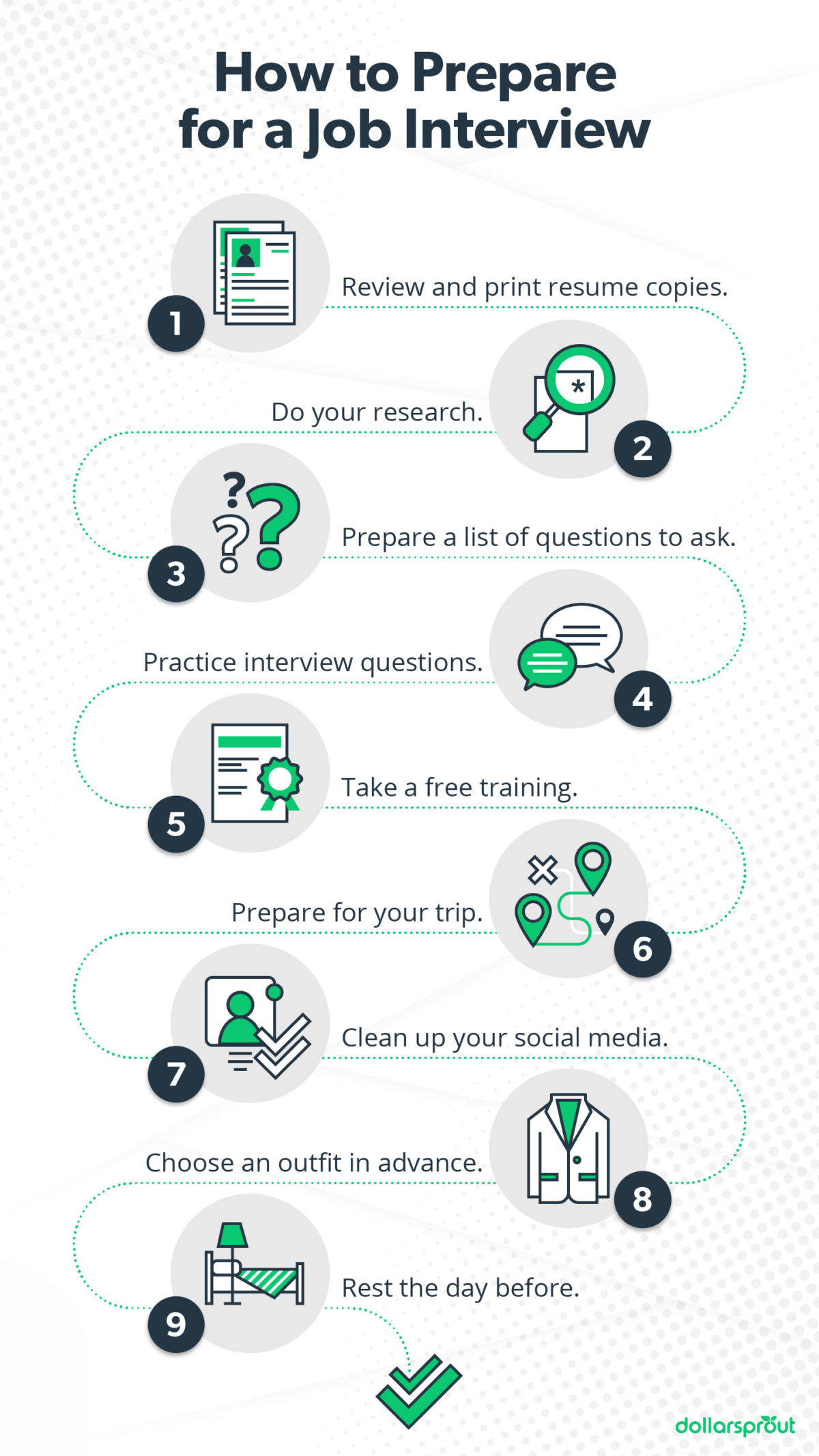How to Prepare for a Job Interview in 9 Simple Steps
Our readers always come first
The content on DollarSprout includes links to our advertising partners. When you read our content and click on one of our partners’ links, and then decide to complete an offer — whether it’s downloading an app, opening an account, or some other action — we may earn a commission from that advertiser, at no extra cost to you.
Our ultimate goal is to educate and inform, not lure you into signing up for certain offers. Compensation from our partners may impact what products we cover and where they appear on the site, but does not have any impact on the objectivity of our reviews or advice.
If you’re wondering how to prepare for an interview the right way, there are several things every hiring manager is looking for and a few ways you can genuinely impress them during your next interview.

Our mission at DollarSprout is to help readers improve their financial lives, and we regularly partner with companies that share that same vision. If a purchase or signup is made through one of our Partners’ links, we may receive compensation for the referral. Learn more here.
For some reason, I can remember every job interview I’ve been on in my adult life. Maybe it’s the profuse sweating or the responses that I swore sounded better in my head.
For many like I, interviews are the most stressful part of looking for a new job. You never know what you’re going to get from an interviewer, and there’s always a curveball question you forgot to prepare for.
While you can’t control the questions or the environment, there are a lot of interview preparation tips that you can use to help you crush your next interview.
9 Steps to Prepare for Your Next Job Interview
If you’re wondering how to prepare for an interview the right way, there are several things every hiring manager is looking for and a few ways you can genuinely impress them.
1. Review and print resume copies.
Bring a folder or portfolio with extra copies of your resume, examples of work, and letters of recommendation or testimonials. There may be multiple people interviewing you, so having something everyone can look at will keep the focus on your achievements.
It’s also important to make your resume stand out. Review and update it to ensure it’s consistent with the credentials and skills the company is looking for.
Other things to bring to your interview include a list of questions to ask the interviewer and something to write with.
2. Do your research.
When preparing for a job interview, one of the ways you can set yourself apart is to have as much knowledge about the company and/or brand as possible.
“Go on its website, social media channels, and LinkedIn page to read about the company’s history, goals, leadership, and current news,” said career coach Michelle Enjoli. “You can also Google the company and read any articles it’s been featured on in the last few years.”
Doing research will give you context as to how the position will contribute to the organization’s goals. You can use that information to anticipate potential questions and prepare some answers.
You’ll also want to research the position’s required skills and responsibilities so you can clearly communicate how your experience relates to each. Finally, research comparable salaries for the position on sites like Glassdoor and Salary.com so you’re ready to negotiate your starting salary when the time comes.
Related: Should You Take a Pay Cut for a New Job?
3. Prepare a list of thoughtful questions to ask.
If you do your research, you should be able to come prepared with questions that will give you additional insight into the company and the expectations of the position. Asking thoughtful questions is important not just to impress your interviewer, but to assess if it’s a company and a position you want to be associated with.
Some questions to ask in a job interview include:
- What would day-to-day responsibilities of the role include?
- What’s your favorite part about working for the company?
- How is individual and company success measured?
- What are the opportunities for professional development?
These questions aren’t just designed to prove that you’re a good candidate. They can help you make a decision about the job if you get an offer.
“Any question that can be answered by looking at the company’s website should not be asked as you should know the information from your research,” Enjoli said.
4. Practice your answers to common interview questions.
One of the most uncomfortable interview preparation tips is to practice answering common interview questions. Practice pays off, and many interviewers can spot the difference between a candidate who practiced and one who didn’t.
You should be able to concisely tell the interviewer about yourself. Prepare quick answers for the following questions:
- Why do you want to work for this company?
- What was a conflict you faced at work and how did you deal with it?
- Why are you looking for a new/different job?
- Why should we hire you?
Rehearsing answers to common questions can also give you something to say if a question catches you off guard, and you need time to think of a relevant response. These responses can also help you steer the conversation back in the right direction if you feel it’s drifting.
Related: How to Change Careers Smoothly in 6 Simple Steps
5. Take a free training.
From the list of skills required for the position, pick the one you feel least confident in and find an online course to improve your skills.
“Additional trainings and certifications will put a candidate in the forefront of the hiring process,” said Nicole Gallicchio, COO of TurningPoint HCM. “There are tons of free and affordable trainings that candidates can take to give their skill set and resume a large boost ahead of the competition.”
Some training sessions that could be beneficial are programming, design, social media, online marketing, and public speaking. Websites that offer free or low-cost online courses in these topics include:
- Udemy
- Alison.com
- Coursera
- edX
Letting your interviewers know you took the extra step of getting online training to improve your qualifications for the position is sure to impress them.
Related: 10 Resume Mistakes to Avoid (and What to Do Instead)

6. Prepare for your trip.
If you have the opportunity to choose a time slot for your interview, do it intentionally. Think about whether you’re most energized in the morning or in the afternoon and consider if there will be traffic along your route.
“Why risk a late arrival due to a traffic tie-up if there’s a later morning slot available at 9:45 a.m.?” said Timothy G. Wiedman, a retired human resources expert and professor.
He also says to beware of being interviewed late on a Friday afternoon.
“By 2:30 p.m., a great many managers (and their staffers as well) start thinking about their weekend plans and may not be completely focused on the quality of the answers that you provide during your Q&A session.”
Whatever time you choose, he recommends arriving at least 25 minutes early. Arriving extra early may also provide some stress relief if traffic or parking problems occur.
“Spend several minutes in the restroom to get yourself looking your absolute best before you meet anybody – including the receptionist,” Wiedman said.
If you’re unfamiliar with the area you might also want to visit ahead of time so you know where to park and the correct entrance to use.
When you arrive, be polite and respectful as you wait. Receptionists are often asked to provide input from their interactions with candidates to the members of the hiring team.
Related: 11 Good Work Habits for Becoming a Stand-Out Employee
7. Check your social media.
You’re not the only person doing a Google search about the company before an interview. Your interviewers are likely doing a search for you on social media. If you have anything on your social media that could be interpreted or misconstrued as inappropriate, delete it or make it private.
Alternatively, if you have personal interests that make you unique, make sure those are public. If you have shared interests with your interviewers, you can create positive associations that may put you ahead of other candidates. These might include references to or pictures of your alma mater, kids, pets, or favorite movies.
8. Choose an outfit in advance.
You only get one chance at a first impression, so be intentional when choosing what to wear to your interview. Be presentable and dress to fit the company culture, but don’t be afraid to show your personality.
“One of the things that I’ve noticed is that I’ve hired people who stand out from the rest,” said Anh Trinh, managing editor of GeekWithLaptop. “Any accessory or article of clothing that’s different tends to get extra points for me.”
A bright headband, funky earrings, or colorful socks can also make you more relatable. Your interviewer doesn’t know much about you, so you can let your personality shine a little with a fun accessory. Just remember not to overdo it. Put in the effort to look refined and presentable and pick one thing that’ll be remembered for the right reasons.
Related: How to Crush Your First Day at a New Job
9. Rest the day before.
Get a good night’s sleep before your interview so you can think clearly and remember what you’ve prepared. If you’re nervous the night before, do something to destress like taking a bath, getting a massage, or going to a yoga class.
Before the interview, get into the right state of mind. Listen to your favorite pump-up jam on the way to the interview, dance out your anxiety, or do anything that lifts your confidence. Remind yourself that you’ve done all that you can do to prepare and let that be enough.
Related: 11 Skills Employers Look for That Most People Never Think About
Don’t Forget to Follow Up
After your interview, it’s always a good idea to leave a lasting impression.
“The day of the interview, you should be sending a thank-you email showing appreciation for their time and expressing your interest in the role,” said etiquette expert Jodi R.R. Smith. “A handwritten note is a great way to reinforce that you are willing to go above and beyond for the job.”
And once you get a job offer, remember to negotiate your starting salary. You can use the information you gathered for the interview to drive your points home and increase your salary faster.
It’s not difficult to learn how to prepare for an interview. A little effort will go a long way in helping you stand out and land your next dream job.








